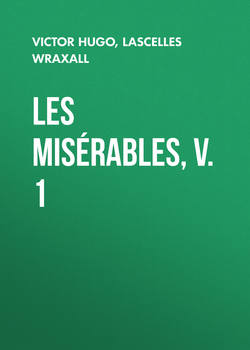Читать книгу Les Misérables, v. 1 - Victor Hugo, Clara Inés Bravo Villarreal - Страница 17
BOOK II
THE FALL
CHAPTER II
PRUDENCE RECOMMENDED TO WISDOM
ОглавлениеOn this evening, the Bishop of D – , after his walk in the town, had remained in his bed-room till a late hour. He was engaged on a heavy work on the "duties," which he unfortunately has left incomplete. He was still working at eight o'clock, writing rather uncomfortably on small squares of paper, with a large book open on his knees, when Madame Magloire came in as usual to fetch the plate from the wall-cupboard near the bed. A moment after, the Bishop, feeling that supper was ready, and that his sister might be waiting, closed his book, rose from the table, and walked into the dining-room. It was an oblong apartment, as we have said, with a door opening on the street, and a window looking on the garden. Madame Magloire had laid the table, and while attending to her duties, was chatting with Mademoiselle Baptistine. A lamp was on the table, which was close to the chimney, in which a tolerable fire was lighted.
We can easily figure to ourselves the two females, who had both passed their sixtieth year: Madame Magloire, short, stout, and quick: Mademoiselle Baptistine, gentle, thin, and frail, somewhat taller than her brother, dressed in a puce-colored silk gown, the fashionable color in 1806, which she had bought in Paris in that year and which still held out. Madame Magloire wore a white cap, on her neck a gold jeannette, the only piece of feminine jewelry in the house, a very white handkerchief emerging from a black stuff gown with wide and short sleeves, a calico red and puce checked apron, fastened round the waist with a green ribbon, with a stomacher of the same stuff fastened with two pins at the top corners, heavy shoes and yellow stockings, like the Marseilles women. Mademoiselle Baptistine's gown was cut after the fashion of 1806, short-waisted, with epaulettes on the sleeves, flaps and buttons, and she concealed her gray hair by a curling front called à l'enfant. Madame Magloire had an intelligent, quick, and kindly air, though the unevenly raised corners of her mouth and the upper lip, thicker than the lower, gave her a somewhat rough and imperious air. So long as Monseigneur was silent, she spoke to him boldly with a mingled respect and liberty, but so soon as he spoke she passively obeyed, like Mademoiselle, who no longer replied, but restricted herself to obeying and enduring. Even when she was young the latter was not pretty; she had large blue eyes, flush with her head, and a long peaked nose; but all her face, all her person, as we said at the outset, breathed ineffable kindness. She had always been predestined to gentleness, but faith, hope, and charity, those three virtues that softly warm the soul, had gradually elevated that gentleness to sanctity. Nature had only made her a lamb, and religion had made her an angel. Poor holy woman! sweet departed recollection!
